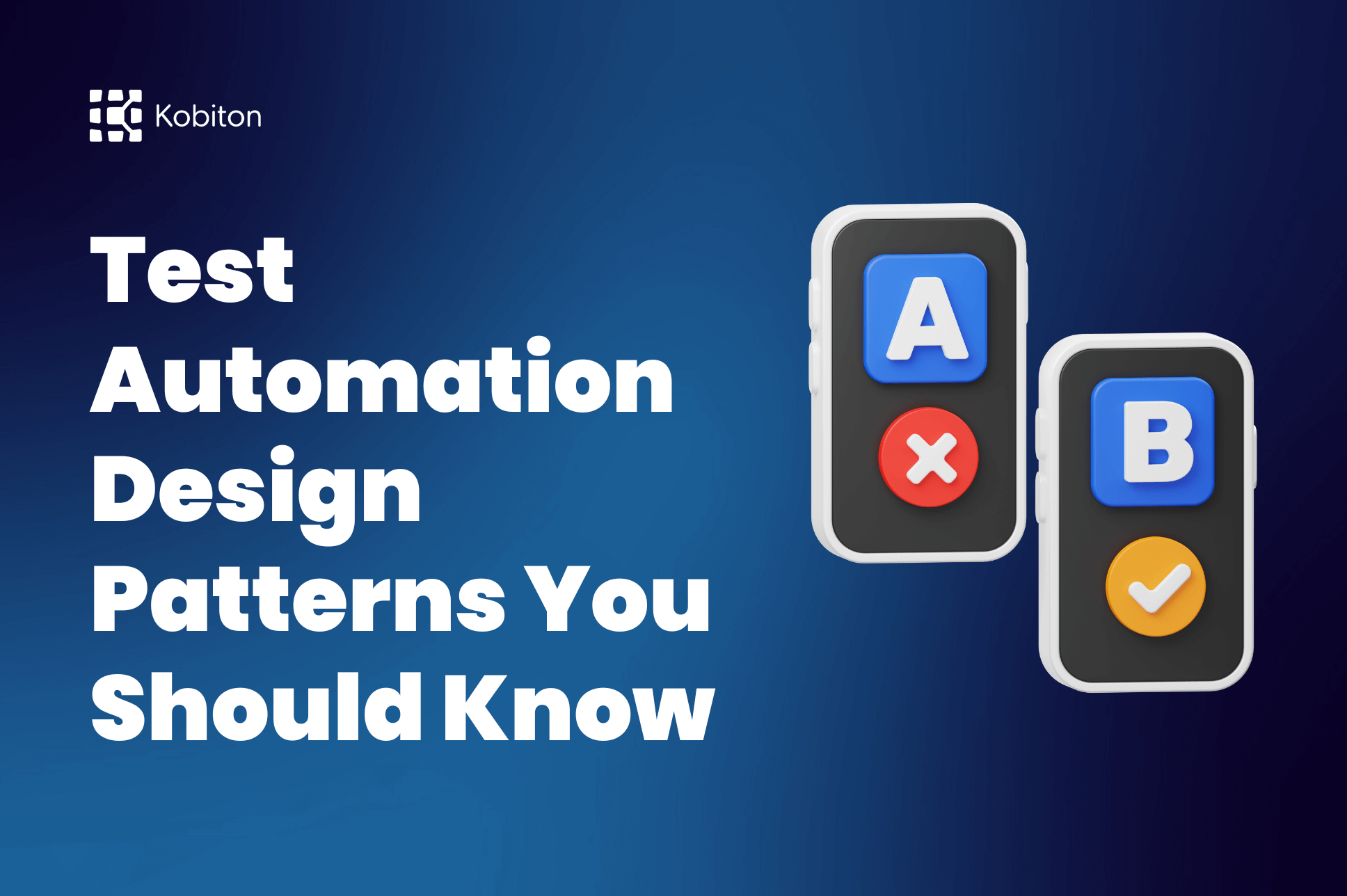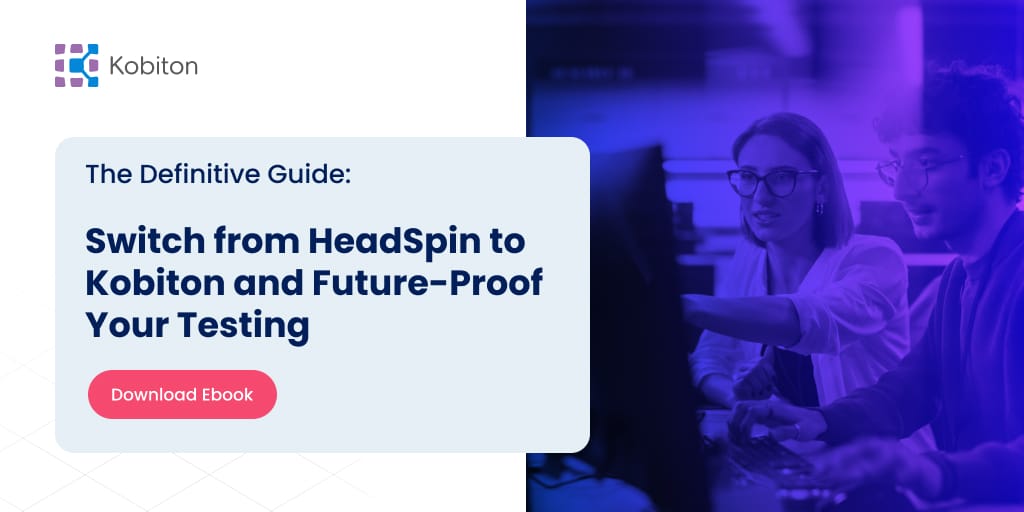
Test Automation Design Patterns You Should Know

Frank Moyer
Are you scratching your head trying to figure out which mobile testing platform is right for you? Well, grab a coffee, and let’s chat about how Kobiton stacks up against HeadSpin.
High costs, performance limitations, and complex integrations are common frustrations for HeadSpin users. But Kobiton offers a smarter alternative that directly tackles these challenges, making it a better fit for businesses that need both efficiency and reliability.
Kobiton boasts real-time testing capabilities, giving teams comprehensive session monitoring and analysis. Issues are caught and resolved quickly on the Kobiton testing platform, speeding up the testing process and streamlining collaboration across teams. In comparison, HeadSpin’s insights are less effective, often focusing on post-test reporting, leading to slower resolutions and dragging out the testing cycle.
Additionally, Kobiton excels in automation with its AI-driven Appium script generation and self-healing scripts. These tools cut down on manual testing efforts and maintenance, which can be a major pain point for HeadSpin users bogged down by time-consuming processes. By Kobiton automating repetitive tasks, teams can focus on bigger testing initiatives, boosting overall productivity.
Xium’s speeds are 3x faster than traditional Appium Tests
When it comes to performance, Kobiton leads, delivering faster test execution speeds and greater flexibility than HeadSpin. With Kobiton, users benefit from testing speeds of up to 30 frames per second (FPS), allowing for quicker test completion and a smoother overall experience. This speed translates directly into faster release cycles, helping businesses get their mobile apps to market more quickly. In comparison, HeadSpin’s testing speeds are roughly half that, or even slower, which can significantly drag out the testing process and delay key releases.
Kobiton also stands out with its range of deployment options—whether you prefer cloud, on-premise, or hybrid solutions, Kobiton adapts to your needs without any of the infrastructure headaches. HeadSpin, while capable, tends to fall short in these areas, leading to inefficiencies that can slow down your testing processes. Kobiton’s versatility and speed make it a superior choice for teams looking to stay ahead of the competition.
Many organizations find HeadSpin’s pricing structure challenging, it’s complicated and often leads to unexpected charges—especially for smaller teams that are working with limited resources.
Kobiton’s pricing is transparent and straightforward. No hidden fees, no confusing tiers—just a simple, scalable model that works for teams of all sizes. Whether you’re a startup, a growing business, or a large enterprise, Kobiton’s pricing is designed to give you access to the features you need. It’s a flexible solution that ensures you’re getting the best value for your investment, no matter what your mobile testing strategy entails.
For mobile testing to be efficient, it has to fit smoothly into your existing workflows. That’s where Kobiton shines. Its platform is built for easy integration, supporting a wide variety of CI/CD tools, automation frameworks, and deployment options. This flexibility means teams can seamlessly plug Kobiton into their processes without any hassle, making it simple to scale up mobile testing as needed.
On the other hand, HeadSpin often runs into issues with certain development environments, especially for teams using customized workflows or niche testing setups. These challenges can slow things down and make it harder to get the most out of the platform. Kobiton’s integration capabilities, however, make collaboration and efficiency a breeze, keeping teams moving forward without technical roadblocks.
User experience can make or break how effective a testing platform is. With HeadSpin, many users find the interface overly complicated, which means new users face a steep learning curve. This can slow down onboarding and hurt productivity, especially for teams that aren’t super technical.
Kobiton, on the other hand, keeps things simple. The intuitive interface makes it easy for testers at all levels to get up to speed quickly. Plus, with features like scriptless automation, even manual testers can automate tasks without needing any coding skills. This straightforward approach means your team can be more productive from day one, delivering high-quality apps faster and with fewer headaches.
HeadSpin’s future is uncertain following its acquisition by PartnerOne, raising concerns about its innovation trajectory. Without a clear roadmap for future advancements, teams relying on HeadSpin risk stagnation, potentially falling behind competitors.
Kobiton, however, is committed to continuous innovation. Regular updates introduce new features like AI-powered test automation and next-gen Appium script generation, ensuring that your team remains on the cutting edge of mobile app testing technology. Kobiton’s dedication to evolution guarantees that your testing needs are met both now and in the future, keeping you ahead of the curve.
In conclusion, while both Kobiton and HeadSpin offer valuable mobile testing solutions, Kobiton stands out with its superior features, performance, and cost-effectiveness.
Here’s what sets it apart:
Kobiton ensures that your team is equipped to tackle the challenges of a mobile-first world, making it the smarter choice for future-proofing your mobile testing efforts. Why settle for less?
Ready to learn more – download our buyers guide today and for an indepth comparison of the speed, flexibility, and innovation that Kobiton brings to the table vs HeadSpin. Discover how easy it is to switch—and why teams like yours are making the move to Kobiton.
